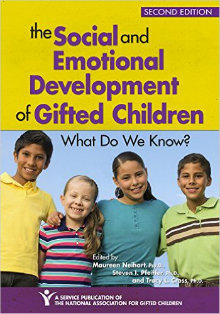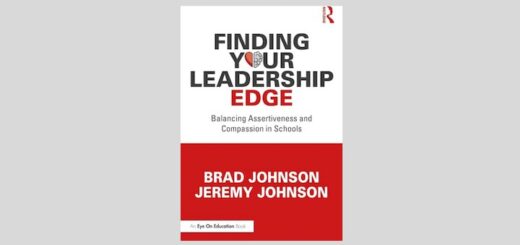Gauging Gifted Students’ Social & Emotional Needs
The Social and Emotional Development of Gifted Children: What Do We Know?
Edited by Maureen Neihart, Psy. D., Steven Pfeiffer, Ph.D., and Tracy L. Cross, Ph.D.
(Prufrock Press, 2016 – Learn more)

First published in 2002 as a review of empirical literature on the social and emotional needs of gifted children, this text serves as the only comprehensive summary of the research conducted by recognized authorities and is often used in graduate Gifted Education classes.
This edition contains much of the same information as the prior edition with additional information on psychosocial variables as predictors of high performance, a focus in each chapter on diversity issues, and a new publication template.

The final chapter, “What Have We Learned and What Should We Do Next?” lists conclusions that can be made from the empirical studies. This chapter also lists Gaps in the Research which would be quite beneficial to graduate students looking for a research project.
Because this text is a conglomeration of different authors’ research, each chapter is written by a different author. This means that some chapters are easier to read than others; however, all chapters are written using educational and statistical jargon.
A few personal reflections
Reading through the different chapters, I was struck by how many unanswered questions we have in working with gifted students. For example, in the chapter on counseling the gifted, Pfeiffer and Burko write, “A number of authors have written about various aspects of counseling the gifted. One basic premise underlying these publications is that the gifted are a unique and misunderstood population. This literature suggests that counseling should be tailored to the specific needs and characteristics of the gifted (Mendaglio & Peterson, 2007; Pfeiffer, 2014). However, there is little specific guidance on how counselors might do this (Peterson & Moon, 2008).”
Perhaps, I was mistaken to think that I would find new or more current information in this text; it is actually numerous articles written in the past, pulled together.
In reading this text, I was hoping to find a book that I could recommend to parents when they come to me with questions and concerns. This is not the book. As I stated earlier, this text is used in graduate level Gifted Education classes. It is written for educators and students of gifted education, not for the average parent of a gifted student.
Tracie Bell-Moon NBCT, M.Ed., is a veteran educator with 18 years of experience. She currently directs a Gifted Education program in a Sioux Falls, SD middle school. Having completed her masters in Gifted Education and Leadership, Mrs. Moon acts as an advocate for gifted students. She believes that gifted students are the future of our society and strives to make sure that their needs are met.



































